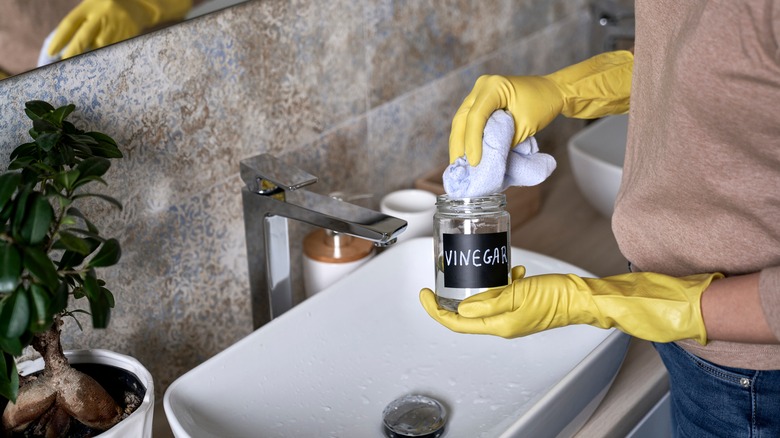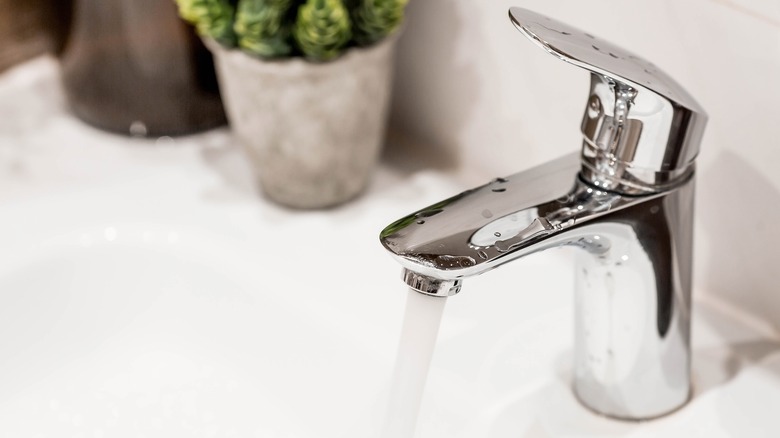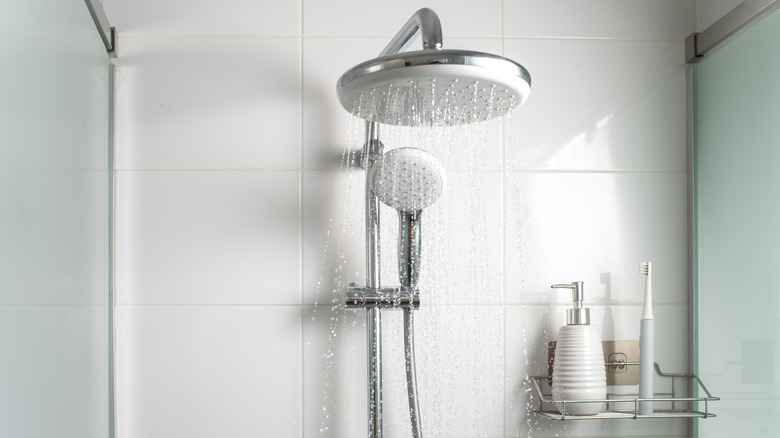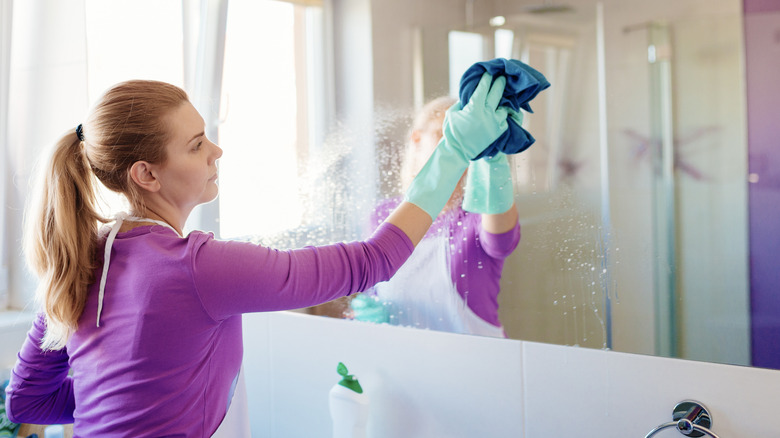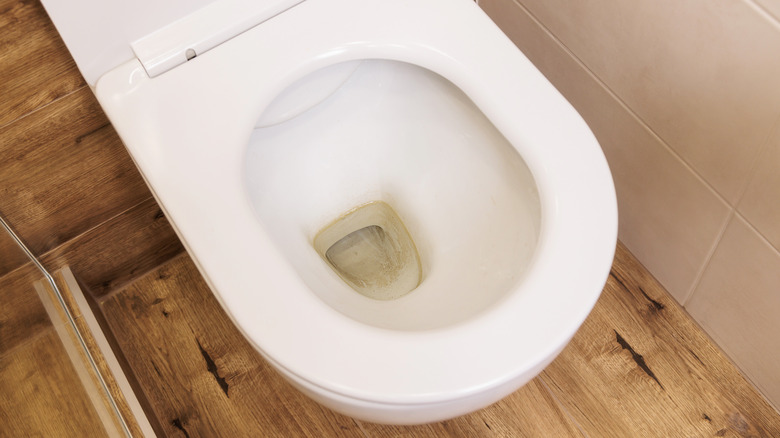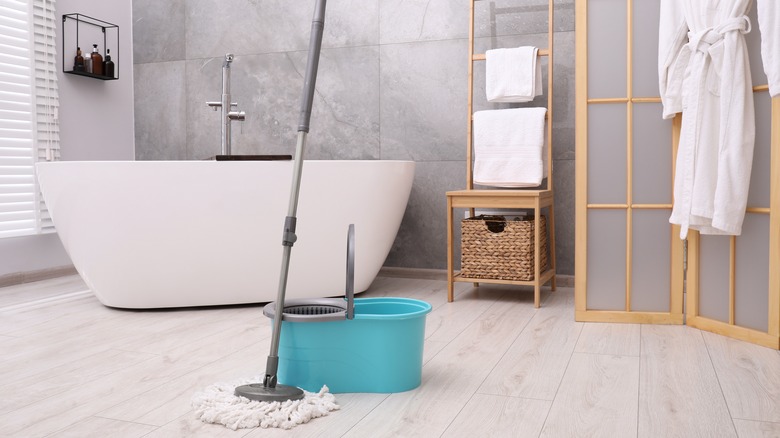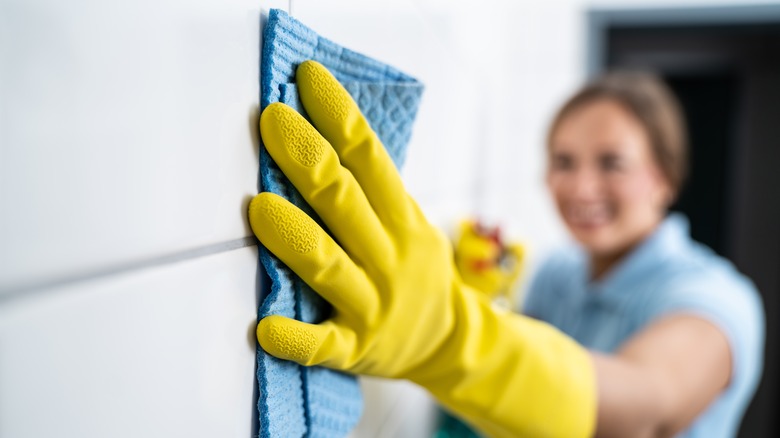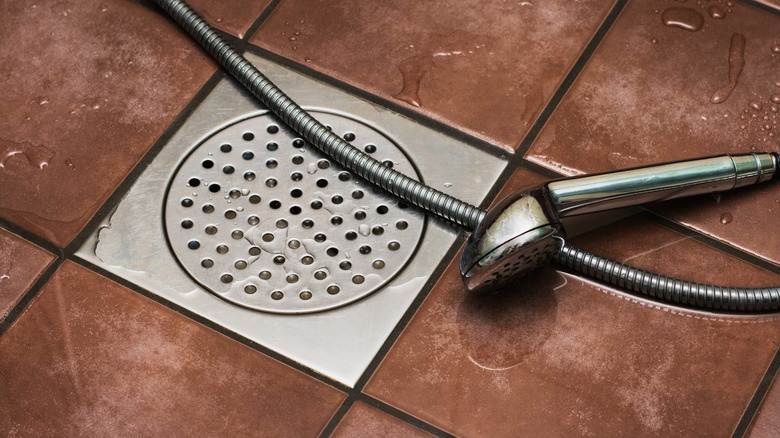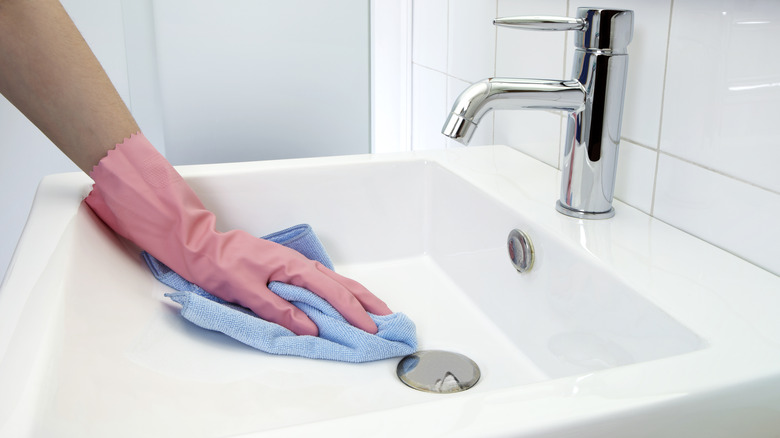8 Vinegar Cleaning Hacks That Will Make Your Bathroom Sparkle
Bathrooms are notorious for problems like hard water stains and streaky mirrors, not to mention toilets that can get super grimy. When you're aiming to cut through muck, products containing chemicals might seem like the best alternative. More and more, though, housekeeping goals have shifted to using substances that aren't so hard on the respiratory system, eyes, and skin. That's where vinegar comes in handy as a bathroom cleaner since its acidity melts away even tough grime and also kills bacteria. Sure, you'll have to avoid cleaning natural stone, like marble and granite, but most other hard surfaces are fair game.
If you're going to use it for cleaning on a regular basis, a gallon of Great Value brand white vinegar runs less than $4, so it can be an economical alternative to other types of bathroom cleaning products, too. Don't like the odor of vinegar? We hear you! You can make scented vinegar very easily by placing some lemon or orange peels, fresh mint, or rosemary in a large glass jug and pouring hot (not boiling) vinegar in over it. Seal the jug, let it sit for 24 hours, and you're ready to fill your spray bottles. And in case you're curious, you can also use apple cider vinegar to naturally clean your bathroom.
How many different ways can you use vinegar to keep your bathroom nice and tidy? Here are eight to try, and some don't even require diluting or mixing to get sparkling results.
Remove mineral deposits from faucets and drains
Because faucets and their handles are uniquely shaped, you can clean them more easily by wetting a towel with vinegar and then draping or wrapping it around your fixture. Let it work for an hour or two, remove the towel, and wipe away any residue. Drains are even easier to clean. Simply put the stopper in place and pour 1/2 cup of vinegar in the basin or tub to cover the stopper and metal surrounding it. Let it sit for a few hours, scrub, drain the vinegar, rinse with water, and wipe it dry.
Clean showerheads
Hard-to-reach showerheads often get overlooked during routine cleanings, but removing hard water stains that build up on them is easy with vinegar. If want to remove the head, simply unscrew it and place it in a container with enough vinegar to cover the bottom of the head. Don't want to remove it? Put a vinegar-filled bag over the head and attach it with a twist-tie. Once it has soaked overnight, wipe away hard water stains with a sponge, reattach the head if needed, and simply shower as usual to rinse the interior.
Clean streaky mirrors
Keeping mirrors clean in busy bathrooms can be a challenge, but vinegar can help you get the job done time and again in an economical way. When mixing up a batch of cleaner to tackle dirty mirrors, use one part vinegar to one part water. Add the liquids to a spray bottle and shake them up. That's all you need to make your mirrors shine beautifully without leaving behind streaks. Also, consider using a microfiber cloth for this task to avoid leaving even a trace of lint.
Remove toilet stains
Have you ever wondered what happens when you put vinegar in your toilet bowl? The answer is simple: It helps remove stains easily. For mild stains, you can add a cup of vinegar to the water and let it sit overnight. Flush it the next day, and that might be all you need. If the stains are stubborn, however, you can consider removing the water from the bowl and trying again. After the vinegar sits overnight, sprinkle in some baking soda for its scouring ability and scrub away the stains. Flush as usual and you're done.
Mop floors
Can you safely mop your floors with vinegar? It depends on the type. You don't want to clean natural stone floors with vinegar, but you can safely clean no-wax linoleum using a mopping solution of 1/2 cup of vinegar to 1/2 gallon of water. Ceramic tile is also a safe bet using 1/2 cup of vinegar to 1 gallon of warm water. You can use vinegar on sealed hardwood floors using the same mixture used for tile, too. Wood shouldn't be soaked with water, however, so wring your mop out really well and use a damp mop instead.
Scrub tile and grout
Of all the areas in your bathroom, you may be wondering if vinegar is strong enough to clean your shower. Yes, it is. Vinegar is safe and effective for both porcelain and ceramic tile and grout. Simply mix one part vinegar to one part water, spray it on your tile, and wipe it away. For scummy build-up, try running hot water for a few minutes to loosen it up, and then spray undiluted vinegar to really penetrate the grime before scrubbing with a tile brush. Stiff toothbrushes are also great tools for deep-cleaning grout using vinegar.
Unclog shower drains
Nothing makes your freshly cleaned shower lose its sparkling-clean look quicker than standing water from a slow drain. Soaps and grime building up in shower drains can make them smelly, too. If you're thinking vinegar might help with this problem, you're on the right track. Try pouring 1/2 cup of baking soda followed by 1/2 cup of vinegar into your drain. Cover the drain, and let it sit for several minutes before carefully pouring a pot of boiling water down. That should wash away the clog loosened by the baking soda and vinegar.
Make a multi-purpose cleaner
For cleaning many spots in your bathroom, you can make a multi-purpose cleaner scented to your liking using 1/4 cup of vinegar, 12 to 20 drops of essential oil, 1 teaspoon of Castile soap, and 2 cups of distilled water. Mix all these ingredients in a spray bottle, and you're ready to spritz and wipe most sinks, bathtubs, and glass shower stalls. Before using cleaners containing vinegar on bathroom countertops made of natural materials, however, follow the manufacturer's guidelines for safe cleaning to make sure the acid in the vinegar won't permanently etch or harm the surface.
